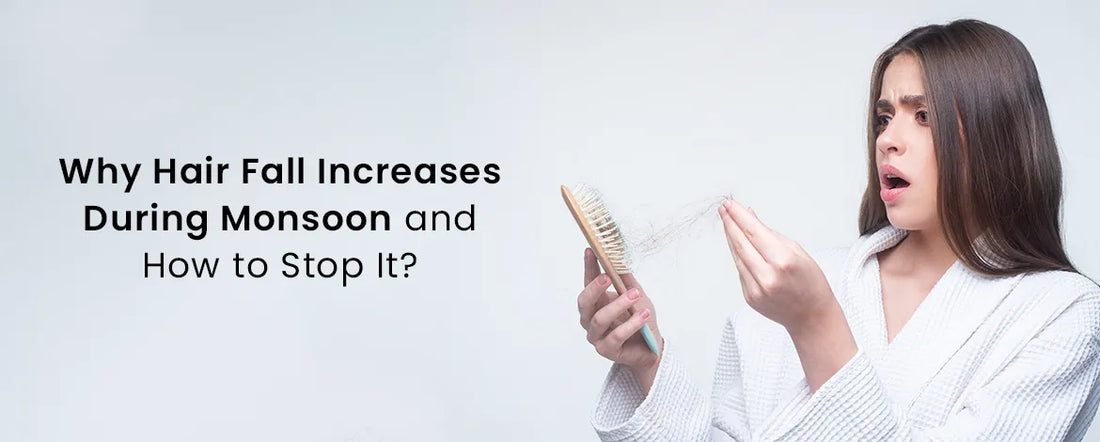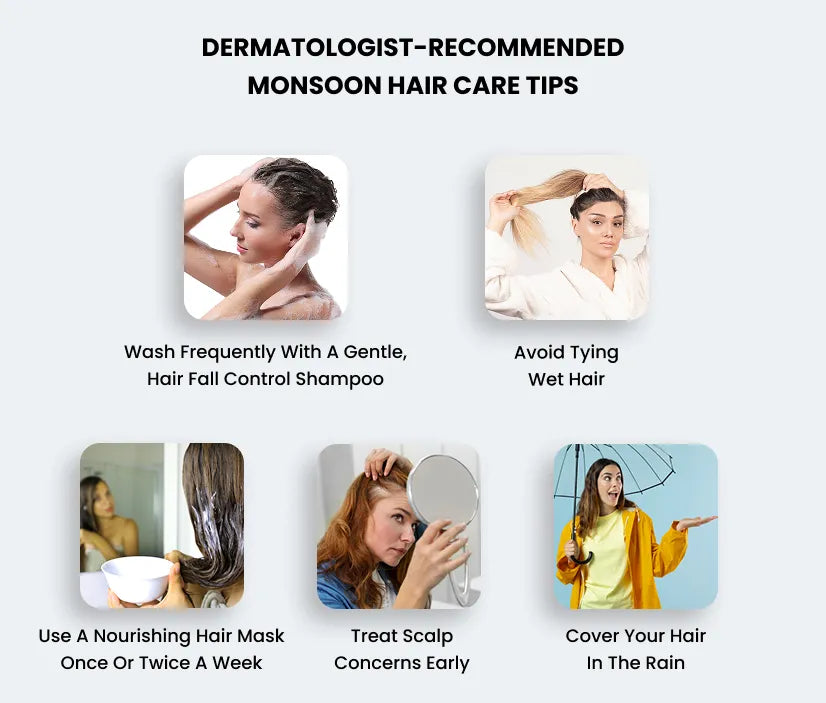
Why Hair Fall Increases During Monsoon and How to Stop It?
By: Sandip KumarTable of Contents
Monsoon is on its way, and who doesn’t love the rainy season. That cool breeze and the first real monsoon downpour. But with this refreshing break from the summer heat, comes the frustration of irritating scalp and hair loss. Hair getting thinner or more strands falling out during this season is what we all hate. And believe us, you are not alone in this. It’s one of the most common complaints dermatologists hear around this time of year.
With strands falling off one after another, you just feel helpless and desperately look for the solution without knowing the reason.
Yes, there’s real science behind it. In this blog, we’re diving deep into why hair fall in the monsoon happens, what’s really going on with your scalp, and most importantly how to get it under control.
Stick around till the end because we’re also sharing dermatologist-approved tips and a monsoon-safe hair care routine powered by FCL’s science-backed solutions to help you fight seasonal hair fall like a pro.
Why Hair Fall Increases During Monsoon: The Science Explained

Let’s break it down. There’s a reason hair fall in monsoon is more than just a coincidence. According to dermatologists, your scalp reacts to seasonal changes especially when humidity is high.
So, what’s actually happening?
- Humidity weakens your hair roots: High moisture levels in the air during monsoon cause your hair follicles to absorb water, swell up, and become weaker at the roots. Weakened roots mean your hair strands are more likely to fall out.
- Fungal infections love this weather: The warm, damp environment of monsoon is a breeding ground for scalp fungus and dandruff. This can clog follicles and cause inflammation, leading to more hair fall.
- Your scalp gets oilier than usual: The humidity in monsoon makes your scalp produce more oil. This extra oil traps dirt and sweat, which can upset your scalp’s natural balance and cause itchiness, irritation, and hair fall.
- Sweat and rainwater exposure damages hair shafts: When rainwater mixes with pollutants, it turns acidic and damages your hair. Plus, sweat buildup (especially if you skip regular washing) creates the perfect environment for breakage.
So yes, hair fall in the monsoon happens less to do with your genetics and more with your scalp’s reaction to the environment. But don’t worry it’s completely fixable.
The Role of Scalp Health: The Root Cause of Hair Fall

First you need to understand that your scalp is also skin. And just like your face can get oily, itchy, or acne-prone during humid seasons, your scalp can face the same concerns.
When your scalp is unbalanced, irritated, or infected, it affects the strength of your hair at the root. That’s why hair fall in monsoon often starts with issues like:
- Persistent dandruff
- Itchy, flaky scalp
- Redness or small bumps (early fungal infections)
- Sticky or oily scalp build-up
To prevent hair fall, you need to stop treating the symptom (hair fall) and start caring for the source (your scalp). A healthy scalp = stronger, more resilient hair.
That’s where clinically formulated solutions come in. Using science-backed products like FCL’s dermatologist-trusted hair and scalp care range can help restore scalp health during the monsoon and stop hair fall before it begins.
Dermatologist-Recommended Monsoon Hair Care Tips

Wondering how to take care of hair in the monsoon without going overboard? These expert-approved tips are easy to follow and actually work.
- Wash frequently with a gentle, hair fall control shampoo: Don’t let sweat, oil, and pollutants sit on your scalp. Use a mild, sulfate-free shampoo like FCL’s Hair Fall Control Shampoo that cleanses without drying out your hair.
- Avoid tying wet hair: Wet hair is extra fragile. Let it dry before tying it up to prevent unnecessary breakage.
- Use a nourishing hair mask once or twice a week: A good hair mask for hair fall helps strengthen strands and repair damage caused by rainwater and humidity.
- Treat scalp concerns early: If you’re prone to dandruff or itchy scalp, opt for shampoos with ingredients like salicylic acid or ketoconazole.
- Cover your hair in the rain: Rainwater might feel romantic, but it’s often acidic and loaded with pollutants that harm your hair. Carry a scarf or hood just in case.
How FCL’s Dermatologist-Formulated Hair Care Range Can Help
When it comes to monsoon hair care, choosing the right products can make all the difference. And if you’re someone who wants real results backed by science, FCL’s hair care range is exactly what you need.
FCL Strengthening Shampoo: The Best Shampoo For Hair Fall And Hair Growth

Your ultimate anti-hair fall solution this shampoo is a favorite among dermatologists for a reason.
- Repairs damaged & over-processed hair
- Significantly increases volume
- Suitable for color-treated hair
- Maintains a healthy scalp and strong roots
- Ideal for daily or frequent use
If you’re looking for the best shampoo for hair fall and hair growth, this is it. Clinically tested, sulfate-free, and safe for all hair types, it’s your monsoon must-have.
FCL Strengthening Conditioner For Dry Hair

Think of FCL Strengthening Conditioner as a post-wash treatment that wraps your strands in love.
- Improves the overall strength of hair
- Nourishes damaged hair with proteins and vitamins
- Uses advanced Crodazoquat MCC technology for smooth, frizz-free results
- Suitable for all hair types
Perfect for restoring shine and bounce to hair dulled by monsoon dampness.
FCL Strengthening Hair Mask:

This hair mask for hair fall is like your to go treatment for weak, brittle, or chemically treated hair.
- Repairs weakened hair fibers
- Rebuilds damaged hair bonds
- Restores elasticity and shine
- Shows visible hair fall reduction in just 4 weeks
With 98% natural, protein-rich ingredients, this creamy mask deeply nourishes every strand from root to tip.
When used as a complete routine, FCL’s shampoo, conditioner, and hair mask offer a powerful defense against monsoon-induced hair fall. Trusted by dermatologists and loved by users, this range helps you enjoy the rainy season without the hair stress.
Wrapping Up On Hair Fall In Monsoon
Monsoon may not be kind to your hair, but with the right routine and science-backed products, you can totally take control.
Remember, hair fall in monsoon is common but it’s not something you have to live with. A clean scalp, smart care habits, and the right products can help you manage it effortlessly.
To treat hairfall effectively make sure to consult your dermatologist and explore FCL’s expert-formulated hair care range trusted by professionals and loved by users. This will keep your hair strong, shiny, and monsoon-proof.
Ready to stop stressing about the strands in your drain? Start your FCL routine today.
FAQs About Monsoon Hair Fall
-
Why does hair fall increase in monsoon?
Increased humidity, fungal infections, and excess oil production all weaken the scalp and hair roots, leading to more hair fall. -
Can rainwater cause hair fall?
Yes, rainwater often contains pollutants and can be slightly acidic, which weakens your hair strands and damages the scalp, increasing the risk of hair fall. -
How to control hair fall in monsoon naturally?
Keep your scalp clean, avoid tying wet hair, use a mild shampoo, and eat a nutrient-rich diet. A consistent care routine goes a long way. -
Is daily hair washing good in the monsoon?
If your scalp gets oily or sweaty easily, it’s okay to wash your hair frequently just make sure to use a mild, hair fall control shampoo like FCL’s. -
Can hair fall shampoo really help reduce hair loss?
Yes, especially when it’s clinically formulated and targets the scalp environment like FCL Strengthening Shampoo. -
How to take care of hair in the monsoon for oily scalp?
Use clarifying shampoos that control oil without overdrying. Wash regularly, exfoliate your scalp gently, and avoid heavy styling products.